

Kawintrada Norach
This webpage is a resource centre for the parent to have a better understanding of adolescents, identity and how it is formed. In addition, there are some suggestions for parenting.
Introduction of this webpage. What Is Self-Concept and How Does It Form? Self-concept is the image that we have of ourselves.
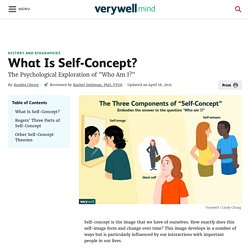
Self concept, self identity, and social identity. Identity SHORT FILM 2012 (Award Winning Inspirational Short) Adolescence and Youth Problems. Adolescence Crash Course Psychology #20. Psychology: Adolescence.
Understanding How Adolescents Think. Teenagers also aren't very good at reading emotion on others' faces.
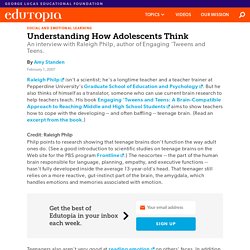
In addition to the obvious physical signs of adolescence, teens and 'tweens are undergoing a major neurological overhaul, which is why that perennial teen mumble "I don't know" may be closer to the truth than we'd realized. What this means for teachers, says Philp, is that they must be both patient and persistent. The point at which teenagers tend to withdraw and ask to be left alone is exactly when it's most important to engage them. Below, Edutopia.org discusses Philp's conclusions with him. What is the first thing teachers need to know about the brains of their teenage students? I think one of the things middle school teachers need to recognize is the incapability of consistency from most kids. For young teachers, this is really hard on their developing confidence. Teachers often make assumptions that their directions have gotten through.
Yes. James Marcia's Adolescent Identity Development. Identity vs. Role Confusion in Adolescent Development. Identity Achievement and Your Teen. James Marcia and Self-Identity - Child Development Theory: Adolescence (12-24) Marcia's Identity Theory: Understanding Adolescents' Search For Identity. Lesson Plan: Identity: Defining Self, Choosing Friends. Download the Lesson Plan Jump to: In this lesson, students explore the factors that influence self-identity, which frequently evolves as adolescents negotiate life’s circumstances to find and secure their places in the world.
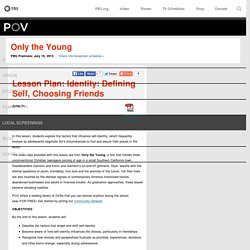
The video clips provided with this lesson are from Only the Young, a film that follows three unconventional Christian teenagers coming of age in a small Southern California town. Skateboarders Garrison and Kevin and Garrison’s on-and-off girlfriend, Skye, wrestle with the eternal questions of youth: friendship, true love and the promise of the future. Yet their lives are also touched by the distress signals of contemporary America–foreclosed homes, abandoned businesses and adults in financial trouble. POV offers a lending library of DVDs that you can borrow anytime during the school year–FOR FREE! By the end of this lesson, students will: Language ArtsSocial StudiesCurrent Events Internet access and equipment to show the class online videoChart paper and markers 1. 2.
ACT for Youth - Adolescence - Adolescent Identity Development. Lifespan Development. Learning Outcomes.

Teenage Self-Identity Issues: Causes, Problems, And Common Behaviors. While there are a variety of ways that teens experience identity formation, some experiences can become very harmful to the individual.
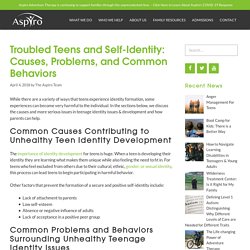
In the sections below, we discuss the causes and more serious issues in teenage identity issues & development and how parents can help. Common Causes Contributing to Unhealthy Teen Identity Development The importance of identity development for teens is huge. When a teen is developing their identity they are learning what makes them unique while also feeling the need to fit in.
For teens who feel excluded from others due to their cultural, ethnic, gender, or sexual identity, this process can lead teens to begin participating in harmful behavior. Parenting Teenagers Academy. Parenting Styles. A Powerful Reminder Why Teens Need Rules And Limits. Imagine being a teenager growing up in a home with no rules, no curfew, and no consequences for anything you want to do.
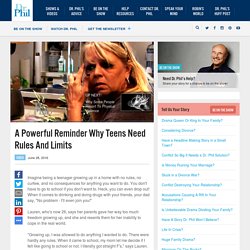
You don't have to go to school if you don't want to. Heck, you can even drop out! When it comes to drinking and doing drugs with your friends, your dad say, "No problem - I'll even join you! " Lauren, who's now 26, says her parents gave her way too much freedom growing up, and she and resents them for her inability to cope in the real world. "Growing up, I was allowed to do anything I wanted to do. WATCH: Dad Who Drank And Did Drugs With Teen Daughter: ‘I Felt Closer To Her Partying’ As for Lauren's dad, John, Lauren says he was more of a friend to party with than a parent. What Teens Need Most From Their Parents - WSJ.
The teenage years can be mystifying for parents.

Sensible children turn scatter-brained or start having wild mood swings. Formerly level-headed adolescents ride in cars with dangerous drivers or take other foolish risks. A flood of new research offers explanations for some of these mysteries. Brain imaging adds another kind of data that can help test hypotheses and corroborate teens’ own accounts of their behavior and emotions. Dozens of recent multiyear studies have traced adolescent development through time, rather than comparing sets of adolescents at a single point.
The new longitudinal research is changing scientists’ views on the role parents play in helping children navigate a volatile decade. Ages 11 to 12 As puberty takes center stage, tweens can actually slip backward in some basic skills. Coaching tweens in organizational skills can help. Parents can help foster sound decision-making, thinking through pros and cons and considering other viewpoints. 50 Multicultural Books Every Child Should Read. This list of must-have multicultural books was originally compiled by the Cooperative Children's Book Center, School of Education, University of Wisconsin-Madison, and is reprinted here with their permission.

Preschool What a Wonderful World by George David Weiss and Bob Thiele, illustrated by Ashley Bryan. Atheneum, 1995. (Multi-ethnic) One Afternoon by Yumi Heo. Scholastic, 1998.